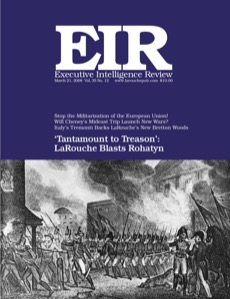LaRouche: Rohatyn Crimes ‘Tantamount To High Treason’
by Lyndon H. LaRouche, Jr.
Lyndon LaRouche opened his March 12 webcast address from Washington, D.C., asserting that investment banker Felix Rohatyn “was guilty of something tantamount to high treason against the United States” for working “with sources which are intent on destroying the United States.” LaRouche’s strategic overview of the global situation showed how we arrived at the danger of fascism again in the world today—including in the United States—and what we must do, immediately, to prevent that from occurring.
Included in the transcript is an extensive question and answer session, dealing with virtually all aspects of the economic and political situation in the country and the world.
The Lisbon Treaty
No to Europe as an Empire! The Militarization of the EU Must Be Stopped
by Helga Zepp-LaRouche
Moves are afoot to change the European Union into a military alliance, closely integrated with NATO, which for its part, would be transformed and used as for interventions all over the world, under all possible circumstances.
France and NATO: Solidarity, Yes; Surrender, Never!
by Karel Vereycken
France Must Oppose the NATO-ization of Europe
by Jacques Cheminade
LaRouche Allies Join Anti-Lisbon Meetings
by Michelle Rasmussen
Economics
LaRouche Declares: Paulson Is ‘F**king Incompetent’
The Federal Reserve emitted $400 billion to bail out the U.S. banking system; Treasury Secretary Henry Paulson released a report by the President’s Working Group on Financial Markets (PWG), which maintained that the system was fundamentally sound, except for a few excesses which need to be curbed. These actions reflect axiomatic blindness so profound it boggles the mind.
Tremonti Places LaRouche’s New Bretton Woods at Center of Debate in Italy
by Andrew Spannaus
Congress Converges on Bailouts To Block HBPA
by Paul Gallagher
LaRouche’s Homeowners and Bank Protection Act (HBPA) is a political hot potato.
National
LaRouche: Rohatyn Fascism Is ‘Tantamount to Treason’
by Jeffrey Steinberg
The future of the Democratic Party and the survival of the United States as a sovereign republic, both hang on whether leading circles in the party wake up to the fact that Felix Rohatyn is, as LaRouche has now, once again, publicly declared, a fascist, an enemy of the United States, and an agent of the City of London-centered British oligarchy, which is going for the end-game destruction of the American Republic—right now.
AAAS Meeting: Judith Rodin Spews Dark Age Propaganda
by Meghan Rouillard
National News
International
Will Cheney’s Mideast Trip Launch New Round of Wars?
by Dean Andromidas
Will ‘Londonistan’ Succeed In Dismembering Pakistan?
by Ramtanu Maitra
The British Oligarchy Turns the Philippines Against China
by Michael Billington
What’s Behind the FARC Cartel’s South American Operation?
by Gretchen Small
The American Patriot
Georgia vs. South Carolina: The Battle Over Slavery in the American South
by Fred Haight
The history of the South is far more complex than most would believe, and is determined by the battle over ideas, not geography. James Edward Oglethorpe (1696-1785), the republican founder of Georgia, created the colony to outflank the Anglo- Dutch oligarchy. Georgia was the first colony to ban slavery, and the last to legalize it! If Oglethorpe had succeeded, the South might have led the way in overthrowing slavery.
Editorial
The Hour of Decision



